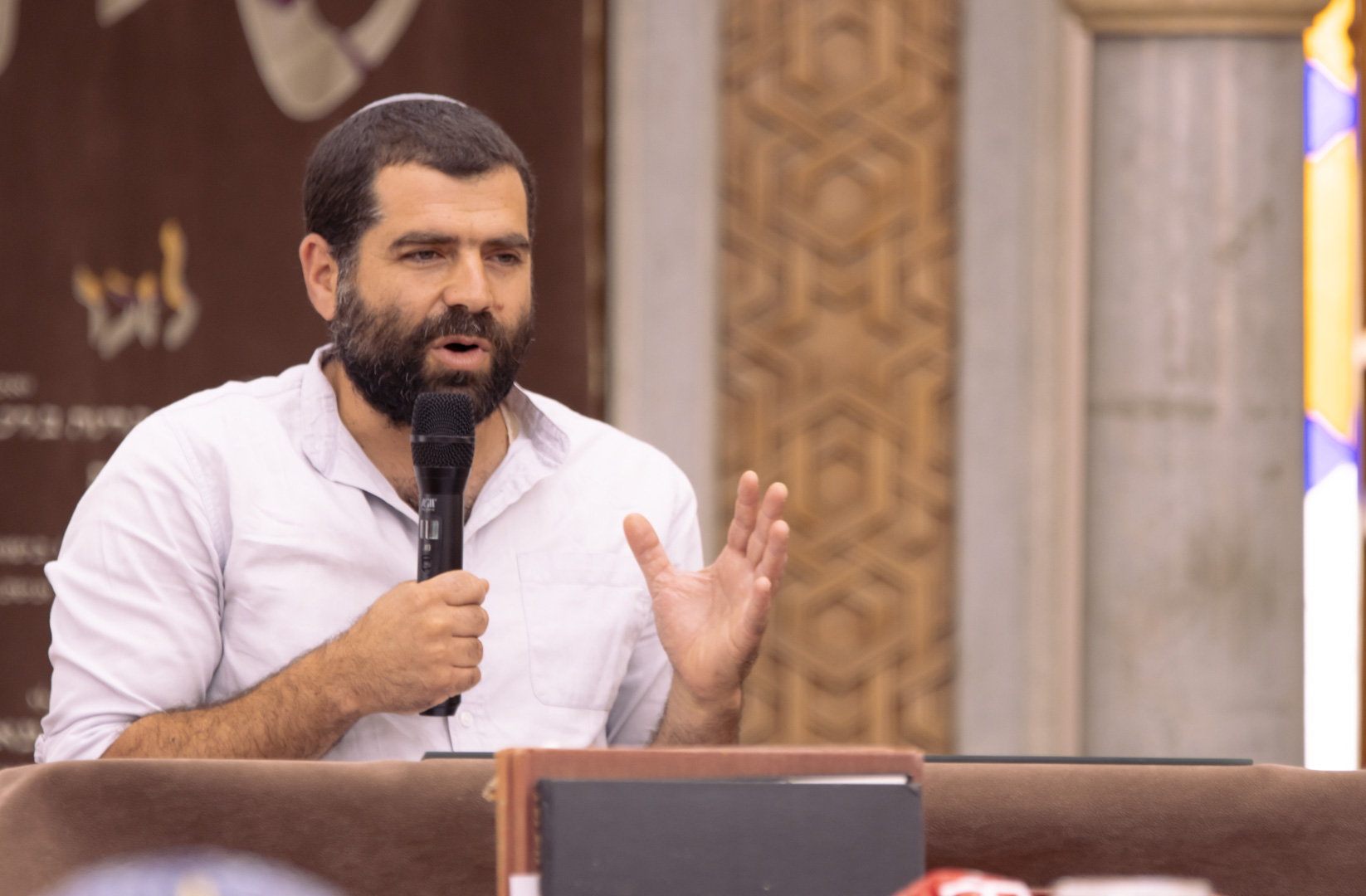נושאים
Translated by Netzach Sapir
Criticism and rebuke have always been part of the Jewish way of life. This was true in the days of the prophets and it continues to be a part of our modern discourse. But it may be surprising to discover that according to the Torah, rebuke is actually seen as a way of preventing or overcoming hatred and antipathy between people: “Do not hate your brother in your heart; you must [instead] rebuke your fellow” (Vayikra 19:17). The commentators explain that the connection between the prohibition to hate and the mitzvah to rebuke is a counterintuitive one: Rebuke makes peace (Rashbam). Criticism is an expression of love, as it says in Mishlei, “For G-d will rebuke he that He loves” (3:12). The verse which follows the injunction to rebuke one’s fellow, “love your neighbor as yourself,” also alludes to this point, and the verse which precedes it, “do not stand idly by the blood of your fellow,” teaches that one who withholds criticism is compared to a person who sees his neighbors blood being shed and does not protest.
But the bitter truth is that today criticism has been corrupted and it tends to have the opposite effect. It deepens rifts between people and groups, creating tension and anger between the criticizer and the criticized. It is very easy to criticize incorrectly. In order for criticism to be constructive, it must be done in such a way as to lift the subject of the rebuke and not to put him down, to enable him to grow and learn from it, and not in order to offend or embarrass him. Good intentions alone are not enough to ensure the success of the criticism, and often there are not even good intentions. The healing of our society will not come when we stop criticizing one another, but when we do so for its original purpose – to promote love and peace.
The book of Devarim begins with Moshe’s rebuke of the nation. Moshe’s words are exceedingly harsh. He does not suffice merely with recounting their wrongdoings and explaining the punishments they received for them (Devarim 1:19-45, and the rebuke continues through parshas Va’etchanan and Ekev), he even holds them responsible for the punishment that awaits him (Devarim 1:37).
One of the great Chassidic masters, Rebbe Yaakov Yitzchak of Pshische, known as the Holy Jew, was said to read a few verses from Moshe’s rebuke of the people every day, for he believed that those words had a special ability to penetrate the heart (Pri Tzedek, Parshat Devarim). So too we will examine Moshe’s words of rebuke – with a focus on their format more than their content – in an effort to learn from them the art of criticism.
Timing is Everything
With any form of rebuke, the timing is at least as important as the content of the remarks. If a person is despondent, criticizing them is liable to only push them down further, to the edge of the abyss. Moshe chose his timing very precisely. The Torah goes out of its way to point out that Moshe’s remarks came “after he struck down Sihon, King of the Amorites…and Og, King of Bashan (Devarim 1:4), that is, immediately following mighty victories when the nation was in high spirits.
Criticism must also come at a time when the receiver is prepared to change. It is hard for a person to change his behavior patterns when he is absorbed in his daily routine. Here also Moshe’s timing is perfect. Am Yisrael is perched on the edge of the Land of Israel, about to enter a new stage and an entirely new way of life.
It is also important to take into account the relationship between the giver and the receiver of the rebuke. By delivering the criticism now, shortly before his death, Moshe ensures that he will have the attentive ear of the people.
Less is More
Another important question for criticism of all types is “how much?” There are some areas where was say “the more the better,” but with criticism the opposite is true. In the books of Shmot, Vayikra and Bamidbar Moshe barely rebukes the people at all. When rebuke comes as a unique, one-time event, people are open to hear it, but when it is a familiar refrain, its targets quickly learn to shut their ears. A friend of mine, an educator by profession, once compared criticism to a pistol with two bullets in it. Over the course of a school year he only gets two shots, so he must think carefully before using them.
End on a High Note
If the goal of criticism is to help a person grow then it must contain a positive element as well. The book of Devarim begins with Moshe’s rebuke of the nation, and it ends with his blessings to them, as in the name of the Torah’s final parsha, “V’zot Habracha.” The Haftorah of Parshat Devarim is also one of fierce criticism (Isaiah chapter 1), but for the following by seven weeks we read Haftorahs that speak of consolation and looking forward to salvation.
Who to Rebuke
One thing which is strange about Moshe’s rebuke of the nation is that Moshe is not rebuking those who have sinned, he is rebuking their children. The parents who sinned were of the generation that left Egypt, and they have since died off in the desert. This becomes most pointedly absurd when Moshe says, “And your young ones who you said would be captured, and your children who do not know today good and evil, they will come to [the Land] and I will give it to them and they shall inherit it” (Devarim 1:39). The people standing before Moshe are not the ones who said that their children would be captured, they are the “young ones” and the “children.” Moshe is not speaking to the ones who transgressed but to their offspring. What is his intention?
The Sfat Emet learns a lesson from here about taking responsibility: “every generation must fix the sin of the generation that preceded it, just as they inherit the merit that the previous generation has left them” (Sfat Emet, Devarim). The children must carry the burden of their parents’ sins.
But even if we understand why the second generation also deserves rebuke, that still doesn’t explain why it is only the second generation, and not the first as, that are the subjects of Moshe’s primary rebuke of the people.
Criticism is a tool for fixing. Not only does the second generation bear a responsibility for fixing the sins of their fathers – in actuality, they are the only ones who are capable of doing that fixing. The Talmud states that “just as it is a mitzvah for a person to speak up when he will be heard, so too is it a mitzvah to refrain from saying something which will not be heard” (Yevamot 65b). Criticizing a person who does not have the capacity to accept what you have to say is liable to only cause damage, as the Gemara there cites, “Do not rebuke the fool, lest he hate you; rebuke the wise man, and he will love you” (Mishlei 9:8). Criticism of the perpetrators would have fallen on deaf ears, but the offspring, with a generation’s distance and perspective, are the ones who are capable of hearing and correcting the past mistakes.
Many times we bear witness to people who wreck their lives with their own two hands. The natural reaction of those who seek the best for them is to try to open their eyes to the root of the problem and their own self-destructive role in creating it. But when it is clear that our words will not be heard and might even cause detachment, it is best to remain quiet and to give them the only thing they are able to receive – warmth without judgment. If this criteria was closely kept, criticism would become a form of flattery, an indication of faith in one’s character, as the following story shows:
Once Rabbi Yisrael of Vizhnitz and his attendant paid a visit to a wealthy banker who lived in their city. The banker invited them into his house, seated them in the living room, and waited to hear what the Rabbi had to say, but the Rabbi Yisrael remained silent for several minutes, then got up and made to leave.
“Why did you come?” the banker whispered to the attendant.
“I have no idea,” the attendant responded.
After they left, the banker couldn’t resist and ran them, following them down the street into the wintry night. When he caught up with them, he asked Rabbi Yisrael, “forgive me holy rabbi, but why did you come to visit me tonight?”
“In order to fulfill the mitzvah of rebuke,” Rabbi Yisrael answered.
“But Rabbi! You didn’t say a word!”
Rabbi Yisrael explained, “part of the mitzvah of rebuke is knowing that if a person will not accept what you have to tell them, you must withhold from criticizing them. That is why I visited you tonight, in order to be silent and withhold my rebuke.”
“But how do you know that I will not accept what you have to tell me?” The banker asked.
“I know you,” answered Rabbi Yisrael, and continued walking down the street.
The curious banker pursued him and begged him to tell him the purpose of his visit. Eventually Rabbi Yisrael gave in.
“There is a widow who is unable to pay her mortgage, and you are going to sell her house and kick her out into the street in the middle of the winter.”
“But Rabbi,” protested the banker, “you don’t understand! I may run the bank, but that money isn’t mine.”
“I knew it,” Rabbi Yisrael said, and continued on his way.
Within a few days Rabbi Yisrael’s words found their way into the banker’s heart and with his own money
the banker paid the widow’s debt.[1]
Rebuking the Town
We will conclude with another story which demonstrates the art of criticism and honest rebuke.
Once there was small village that hired a man to go around before the High Holy Days and rebuke the townspeople. Every year he would pick a different subject to focus on – honesty in business dealings, keeping Shabbat, etc. Throughout the entire month of Elul and during the ten days of repentance he would stand in the marketplace or walk in the streets and reproach people for the error of their ways.
But on the afternoon before yom kippur, with the culmination of his annual duties, he would gather all the people of the village and each year he would tell them the same story:
Once upon a time there was a man who developed a skin malady. The doctors told him that in order to heal, he had to bathe every day. But there was no bath house in his village nor anywhere nearby. He had nearly given up on recovering from his disease when one night he thought of an idea. The next day he started going around the village excitedly telling everyone his vision for the future of their town. “Although today we are but a small village,” he told anyone who would listen, “if we are clever and build a bath house then we’ll be something special. People will come from all around, business will flourish, hotels will sprout up like mushrooms after the rain…”
Eventually, he succeeded in convincing his village of the wisdom of his plan. They gathered the funds, built the bathhouse, and asked him to speak at the grand opening. As he looked out on the shining faces of the audience, he felt he could no longer conceal his true motives.
“My dear friends,” he began, “I truly hope that this bathhouse will indeed bring blessing to us all. But I must tell you the truth. The real reason I convinced you all to build this bathhouse was because I need it for myself, and I simply couldn’t have done it without you.”
The town-criticizer concluded his story. He looked out at the townspeople whom he had just spent over a month rebuking, and they understood that the story was really about them.
[1] Based on a story from Words that Hurt, Words that Heal, Joseph Telushkin, New York 1996, pp. 99-101.



























